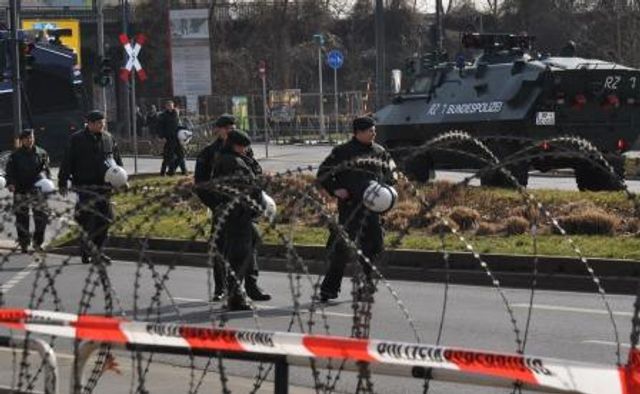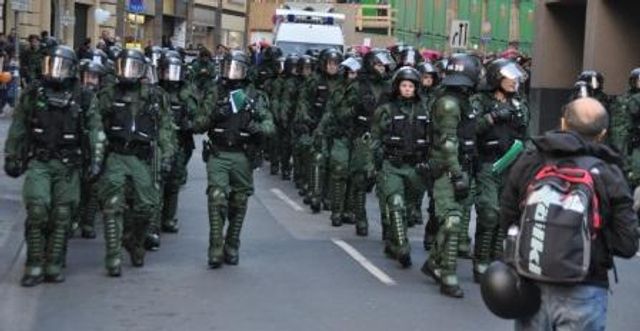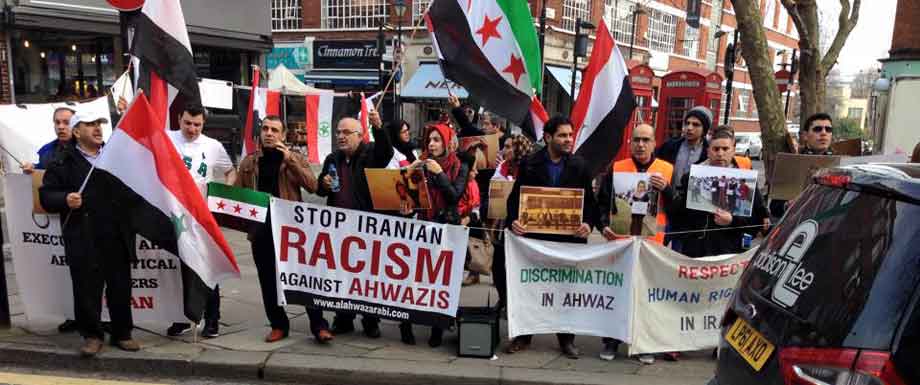Christoph Dreier
The German media and politicians have responded to the Blockupy protests against the ECB on Wednesday by denouncing the protesters and demanding restrictions on the freedom of assembly. They seized on clashes prior to the demonstration, involving a few small autonomous and anarchist groups, as a pretext. The protest organisers explicitly distanced themselves from these fringe elements.
 Police line in front of the ECB
Police line in front of the ECB
On Thursday, a debate in the German parliament was immediately called on the protest in Frankfurt. Interior Minister Thomas de Maizière opened with an aggressive attack on the demonstration organisers, which included trade unions, the Attac anti-globalisation movement, and the Left Party.
“The organisers of the Blockupy alliance are jointly responsible for what happened yesterday,” said de Maizière. “Even the name Blockupy indicates nothing peaceful. It is a combination from blocking and occupying. I don’t think that has much to do with peaceful demonstration.”
In addition, the minister declared that those criticising the massive police intervention were downplaying the violence on the fringe of the protest. De Maizière exaggerated the events, calling them a “swath of destruction,” which were the expression of “blind destructive rage.”
Johannes Kahrs from the Social Democrats (SPD) declared the organisers and the Left Party fraction in parliament to be “supporters” of violence. “What happened there in the morning, the violence that took place, which is unacceptable and occurred with the support of Blockupy and the Left Party, cannot be tolerated,” he said.
In an interview on Thursday morning on RBB Inforadio, Green Party chair Simone Peter declared the organisers were responsible for checking who comes to the protest. The Blockupy alliance had thus damaged Frankfurt’s reputation, said Peter.
The arguments of the political parties’ representatives, repeated in numerous media outlets, are absurd. They are aimed at banning protests and doing away with the basic democratic right of freedom of assembly. If protest organisers are made responsible for every participant’s actions, the door is left wide open for political provocations against any protest or political organisation.
The so-called Black Block, which was responsible for the violence in Frankfurt, is heavily infiltrated by the police and intelligence services, and often functions as provocateurs.
At the same time, the Christian Democrats (CDU), SPD and Greens praised the mass police crackdown in Frankfurt to the skies. “The police are protecting the public good of the freedom of assembly. They deserve our thanks and respect,” said Irene Mihalic from the Green parliamentary fraction. Burckhard Lischka (SPD) said that the police had “defended all of us and our values.” De Maizière referred to a “democracy on guard” that has to defend itself.
In fact, the police did everything to escalate the situation. They transformed the city into a fortress that resembled a police state. 8,000 police and 28 water cannons were assembled from across the country. On the day of the protest, officers repeatedly took brutal measures against demonstrators on their way to the protest or who peacefully blocked roads. They used water cannon, tear gas and batons.
 Police marching near the ECB
Police marching near the ECB
The hailing of this police violence and the criminalising of the protesters by the political parties is aimed at suppressing all opposition to their social attacks and building up the structures of the state.
In parliament, Mihalic demanded a “debate about the equipment and personnel in the police.” Stefan Mayer from the CDU also called for a “better equipping of our police officers.” In addition, he advocated the strengthening of the criminal offence of “resisting state power.”
The police trade union (DpolG) also demanded stronger laws. DpolG chair Rainer Wendt called in Handelsblatt for “those who refuse to remove themselves from a violent crowd after being ordered to do so to also be prosecuted.” In this way, even participating in a demonstration could be declared a criminal offence.
In its key points for the 2016 federal budget, which were leaked to the media, the government plans to increase police and intelligence services budgets by €328 million by 2019. A total of 750 new posts are to be created. The interior ministry budget will rise 6.7 percent next year.
The buildup of the state and the aggressive support of bourgeois politicians of all stripes for attacks on democratic rights are the direct response to growing social inequality in Europe.
The policy of social cuts, for which the ECB bears considerable responsibility, has led to mass poverty, unemployment and desperation, particularly in the countries of southern Europe. In their negotiations with Greece, it is clear that the European elites are preparing for a new round of social attacks that are to be expanded throughout the whole continent.
Such policies are incompatible with democratic rights for the population. They lead to ever more dictatorial forms of rule, in which all forms of protest are to be suppressed and the population intimidated.
